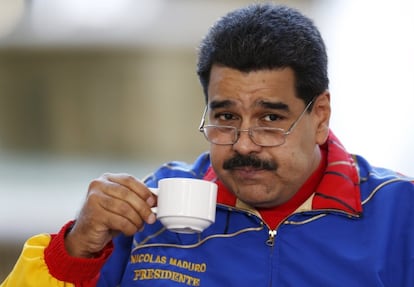Spain complains to Venezuela about Maduro’s latest insults aimed at Rajoy
In a televised address, the president called Rajoy “a public hitman”

The verbal incontinence of the Venezuelan president, Nicolás Maduro, has once again tried the patience of the Spanish Foreign Ministry. The Venezuelan ambassador to Madrid was this week called in to the ministry so officials could convey the Spanish government’s displeasure with the recent insults President Nicolás Maduro has flung at Prime Minister Mariano Rajoy.
In a televised address, the Venezuelan president called Rajoy “a public hitman,” and said that Spain’s new Citizens Safety Law, which was passed recently, “was nothing but a blow to democracy from Rajoy in the name of [dictator Francisco] Franco through this gag law.”
Spain is upset by the unacceptable insults” made over the weekend by Venezuelan President Maduro
The controversial Citizens Safety Law, which went into effect on July 1, puts limits on public protests and demonstrations and prohibits people from taking photographs of police officers even when law enforcement officials are committing abuses. It was rejected by all the opposition parties in Congress.
Pablo Gómez de Olea, the ministry’s director general for Ibero-American issues, met with Isea to convey “the Spanish government’s firm rejection and its displeasure over the slanderous statements and descriptions” the president made about Rajoy.
In a statement issued by the Diplomatic Office of Information, the Foreign Ministry said that it lamented that Maduro “continues to use disrespectful statements, which do not help to improve relations.”
The incident marked the second time in three months that the Venezuelan Foreign Ministry had called in Isea to convey the government’s displeasure regarding Maduro’s attacks.
In April, the Venezuelan president called Rajoy “a racist” after criticizing the Spanish Congress’s passage of a non-binding resolution that called for the release of jailed opposition leader Leopoldo López and Caracas Mayor Antonio Ledezma, who have both been charged with sedition and other crimes.
A week after that incident, Madrid recalled its ambassador in Caracas, Antonio Pérez-Hernández, for consultations after Maduro continued to insist that Rajoy was supporting international terrorism and was part of a coup plot being hatched in several countries against his government.
In May, the two countries patched up their differences after Maduro made a conciliatory gesture toward Madrid and the Spanish ambassador was sent back to Caracas. For its part, Venezuela had sent back its own ambassador in February after recalling him four months earlier.
This latest diplomatic spat was ignited by the recent visit of a Spanish senate delegation that tried to meet with López but was denied permission. The senators – Dionisio García of the Popular Party (PP), Iñaki Anasagasti of the Basque Nationalist Party (PNV), Ander Gil of the Socialists (PSOE) and Josep Maldonado Catalan nationalist bloc (CiU) – were able to meet with Ledezma, who is under house arrest.
Maduro is upset about the recent visit of five Spanish senators who tried to meet with a jailed opposition leader
Maduro never downplayed his own displeasure at the visit.
“It is very irritating that people from Spain come here to tell Venezuela what we should be doing,” he said. “That is sickening […] We don’t need Rajoy’s the far-right to draw up a plan – 200 years after independence – to decide what direction we should take.”
Against this backdrop in the dispute are the scheduled parliamentary elections on December 6 and fears by many in the international community that Maduro would maneuver to throw the race in his party’s favor. Several opinion polls have predicted that the opposition may win a majority for the first time in the National Assembly.
Tu suscripción se está usando en otro dispositivo
¿Quieres añadir otro usuario a tu suscripción?
Si continúas leyendo en este dispositivo, no se podrá leer en el otro.
FlechaTu suscripción se está usando en otro dispositivo y solo puedes acceder a EL PAÍS desde un dispositivo a la vez.
Si quieres compartir tu cuenta, cambia tu suscripción a la modalidad Premium, así podrás añadir otro usuario. Cada uno accederá con su propia cuenta de email, lo que os permitirá personalizar vuestra experiencia en EL PAÍS.
¿Tienes una suscripción de empresa? Accede aquí para contratar más cuentas.
En el caso de no saber quién está usando tu cuenta, te recomendamos cambiar tu contraseña aquí.
Si decides continuar compartiendo tu cuenta, este mensaje se mostrará en tu dispositivo y en el de la otra persona que está usando tu cuenta de forma indefinida, afectando a tu experiencia de lectura. Puedes consultar aquí los términos y condiciones de la suscripción digital.









































